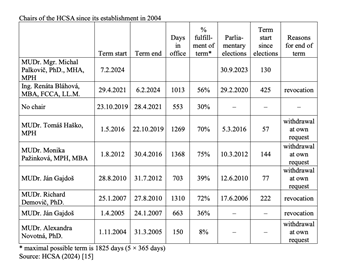The Health Care Surveillance Authority (HCSA) plays an important regulatory role in the Slovak health system. Responsible for supervising health insurance, purchasing and healthcare markets, HCSA chairs are elected for five-year terms and are theoretically independent, given an irrevocable mandate as chair. This independence was written in the original legislation from 2004 that specified that a chair’s mandate could only end due to their own resignation, by power of the government (only after the chair committed an intentional crime) or the chair died.
Successive governments over the past two decades, however, have worked to install chairs corresponding to their particular (political) needs, given the prominent role the HCSA plays in regulation. Thus, through the years, changes of chair have become common after legislative amendments to §22 of Act 581/2004, the law that defines the conditions of a chair’s appointment and the revocation process (for example, clauses permitting the removal of the chair were added regarding subjective evaluations of the chair’s performance, or general (subjective) views of the Government that the chair cannot complete the mandate due to personal, moral or professional reasons). Since the establishment of the HCSA 20 years ago, not one of the seven chairs have served a full term (see Table 1): their mandates were either revoked (3x) or they resigned on their own (4x).
As no chair has served a full term, the record of longest term was Monika Pažinková, who served 75% of her term (2012–2016), while the shortest was under the first chair, Alexandra Novotná (2004–2005). Additionally, and crucially, the HCSA had no chair from the end of 2019 through the first year of the COVID-19 pandemic, a total of 553 days. Chairs are typically changed following parliamentary elections, so there is little overlap of incumbent chairs continuing to serve in a new government, even if their term is ongoing. There have also been four instances of new HCSA chairs coming into office within the first five months after parliamentary elections.
The four cases of chairs withdrawing from leading the HCSA include:
- Alexandra Novotná served for 150 days in 2005 (8% of the planned mandate duration). After establishing and stabilizing the institution, she relinquished her position to the State Secretary of the Ministry of Health, Ján Gajdoš, who decided to assume the role he had originally planned to take. As a result of her resignation, a position exchange occurred with the then-State Secretary, Ján Gajdoš [1].
- Ján Gajdoš after 703 days in 2012 (39% of planned term). His resignation came in reaction to an amendment of law 581/2004 that once again enabled the Minister of Health to remove the chair of the HCSA. Gajdoš cited disagreements with the politicization of the office of HCSA Chair and a de facto subordination to the Ministry of Health [2].
- Monika Pažinková after 1368 days in 2016. Pažinková became a symbol of patronage in office, being closely connected to businessmen from the city of Košice and the Smer political party [3].
- Tomáš Haško after 1269 days in 2019 because of irregularities in tender process for emergency vehicles that he oversaw [4].
The three cases of governments revoking mandates for HCSA chairs include:
- Ján Gajdoš after 663 days in 2007. While the Health Minister at the time (Valentovič) stated Gajdoš’ dismissal was the result of the office's performance given the state of healthcare in Slovakia at the time, Gajdoš himself considered it to be political, not professional [5].
- Richard Demovič after 1310 in 2010. He was dismissed by Health Minister Uhliarik using the same reasoning (poor performance) [6].
- Renáta Bláhová after 1013 days in 2024. The Health Minister’s (Dolinková) dismissal justified this by saying that Bláhová does not meet the qualifications to be chair as required by law and that she is a political nominee, appointed to the position of chair without a selection process [7].
Increasing the institutional stability and independence of the regulatory frameworks (see for example, Balík (2012 [8])) and environment in Slovakia requires
- reestablishing the HCSA Chair’s independence by abolishing the legislative clause on their removal by the government without formal reason,
- strengthening the competences of the HCSA’s Board by transferring the decision-making powers from the chair, making the HCSA a collective decision-making body and not a single “one-person show”, and
- transferring the HCSA’s supervisory role over health insurance companies (HICs) to the National Bank of Slovakia and thus fulfilling an initial plan from 2004 when the HCSA was established.
The National Bank of Slovakia is an independent financial institution that could effectively supervise the financial situation of HICs. This would achieve the diversification of authority and preserve independence and resistance to political power, which is characteristic of regulators in other countries with competition-based systems (that is, multiple health insurers), like Germany (Federal Office for Social Security [9] and Federal Financial Supervisory Authority [10]), Switzerland (the Federal Office of Public Health [11] and the Financial Market Supervisory Authority (FINMA) [12]) and the Netherlands (The Dutch Healthcare Authority [13] and the Netherlands National Bank [14]).
Table 1

